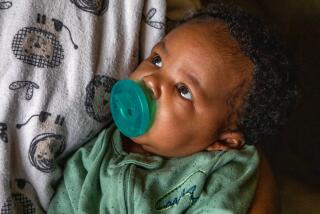Grieving Parents Endorse Warning on Strollers : Child safety: Mar Vista couple lost a lawsuit, but authorities now advise parents of carriages’ dangers.
- Share via
Acting after the fifth report in two years of an infant’s strangulation in a baby stroller, the federal Consumer Product Safety Commission and New York state authorities have issued warnings to parents about the dangers of leaving small babies unattended in their carriages.
The warnings came as a Mar Vista couple failed in their attempt to win a new trial against Aprica/Kassai, manufacturer of the stroller in which their 5-month-old son was found choked to death five years ago.
Charging that a jury member violated the judge’s instructions by going to a store to inspect baby strollers, Gail and Haim Pekelis asked Santa Monica Superior Court Judge Robert T. Altman to declare a mistrial.
But Altman denied the request late last month after Aprica provided statements from nine of 12 jurors saying that no improper actions were taken. The Pekelises lost their product liability case against Aprica and several other defendants by a 9-3 vote in February.
“I think that’s it for everything,” Haim Pekelis said Monday.
Although he said he is concerned about the possibility of having to pay as much as $12,000 toward Aprica’s legal costs, Pekelis said he took comfort from the statements issued by U.S. and New York authorities last Thursday.
In a press conference in Manhattan, spokesmen for the two agencies said that there had been at least five similar cases in the past two years.
The latest death, also in an Aprica stroller, was that of a 6-month-old girl in Yonkers, N.Y. While lying asleep on her stomach, she slipped through the front of the stroller and choked after catching her head in the leg opening, her parents said. The parents were in a nearby room at the time. The baby died two days later.
Sandy Moore, administrative manager of Aprica USA Inc., the American distributor for the Japanese-owned stroller company, said the New York case has not been formally reported to the company.
But she said that Aprica strollers all conform to industrywide standards that are continually reviewed by panels of consumers, government officials and company representatives.
“Speaking from a mother’s point of view, you can’t make a product that’s going to be consumer-proof,” she said.
In the Pekelis case, she said, “What happened was that the parents were caught up in their daily activities, they weren’t thinking at the time, and they left the baby alone. Basically, the accident wouldn’t have happened if they didn’t leave the baby alone, and it wouldn’t have happened if they’d have used the safety belt.”
She said she tested a similar stroller on her own son and found it easy to secure him in place.
“A lot of new mothers might feel it’s inconvenient but you’ve just got to take the time to use the product correctly,” she said.
New York safety officials learned about the Sept. 11, 1991, death after a neighbor showed the dead girl’s parents an article that had appeared in the Los Angeles Times about the Santa Monica case.
“This is truly a tragedy, and parents, guardians, baby-sitters and child care-givers must become aware of the hazards associated with stroller use to prevent such deaths from occurring,” said Richard M. Kessel, executive director of the New York State Consumer Protection Board.
Richard Swackhamer, regional director for the federal commission, said that federal officials will be working with manufacturers’ groups to modify the voluntary design standards that govern the industry.
Meanwhile, he said, “individual products are evaluated on a case-by-case basis for possible hazards.”
Albert Maruggi, public affairs director for the Consumer Product Safety Commission, said the essential message to the public is that strollers should not be treated as if they were cribs. “You can’t leave the infant unattended,” Maruggi said.
Maura Davis, public relations director for the Juvenile Products Manufacturers Assn., said she could not comment on individual cases, but she echoed the warnings of the government safety officials.
“Juvenile products are not baby-sitters,” she said. “And you must read the manufacturers’ instructions and stick to those directions.”
The government officials declined to say which stroller brands were involved in individual cases, but Gail Pekelis said she was aware of three cases involving Aprica products.
“The (Pekelis and Yonkers) cases are identical, sadly,” said Jay Dankner, attorney for the New York parents, who are considering whether to file a suit. “There were (safety) straps, but they were not being used, mostly because of the bad design and not being able to use it when the kid is sleeping.”
Dankner said the existence of an Aprica-held patent, never marketed, for a box to close off the front end of the stroller when it is in the flat position for sleeping shows that the company was aware of the danger.
But Moore, whose company is based in Anaheim, said that she believes that making the box available would send the wrong message to parents.
“The box is going to say that it’s OK not to use the safety strap, that it’s OK to leave the baby by itself. By saying to parents it’s OK to do this, we’re going to see a lot more deaths, especially if they leave a baby by itself,” she said.
More to Read
Inside the business of entertainment
The Wide Shot brings you news, analysis and insights on everything from streaming wars to production — and what it all means for the future.
You may occasionally receive promotional content from the Los Angeles Times.










